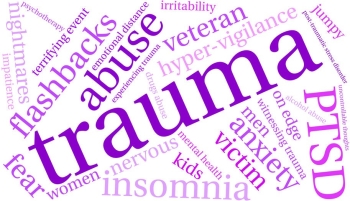
What is Trauma?
From a trauma counseling therapist’s perspective, trauma is defined as a deeply disturbing experience, which can be sexual, physical and / or emotional. Here at the Center for Growth in Philadelphia, we include experiences that feel less than nurturing. Our definition purposely is wide because we believe that trauma can come in all shapes and size. With that being said, the healing process looks different based on the duration and the extent of the trauma as well as the supports in place.
Traumatic experiences tend to change the way we view the world. To protect ourselves from future traumatic experiences we develop coping mechanisms. leave a significant impact on our worldview, our defense mechanisms, and coping skills. The effects of trauma vary person to person. No two people react to a negative, traumatic event in the same way. In trauma counseling, our goal, and our hope is to help individuals develop new strategies for not only healing but to better cope with the negatives that life throws our direction.
Within The World Of Trauma Counseling, We Believe There Are Three Primary Types Of Trauma: Physical , Emotional, and Sexual Trauma.
Physical Trauma- Physical trauma includes anything that caused you physical, bodily harm, anything that caused or threatened your physical safety.This includes physical abuse (spanking, hitting, pushing, etc). Most people think of brain injuries, or lost limbs when they hear the word physical trauma. That is physical trauma, but it also goes beyond. Overall it’s unexpected, unwanted harm to your body and/or physical safety. Effects of physical trauma include: Sadness, anger, grief, discomfort with certain types of closeness or physicality, extra awareness or increased need for physical safety/distance from others in certain settings, flashbacks or memory loss, change in sleep and eating patterns, change in one’s usual routine and functioning. Physical trauma doesn’t necessarily leave physical, visible scars. These scars are sometimes unable to be seen, either impacting an individual’s ability to be comfortable in certain situations involving physical space and distance, touch/affection, etc. It is possible to endure serious physical trauma, and survive without injury, but still occasionally feeling the physical impact you preciously experienced.
Emotional Trauma- Emotional trauma is often a response to distressing events. Example of events include: serious automobile accident, sexual or physical assault, unexpected loss, a breakup, act of violence/armed robbery, natural disasters, abandonment, serious sports injury, childbirth trauma, etc. The effects of emotional trauma include anxiety, flashbacks, panic attacks, poor decision making, irritability, change in sleep or eating (more or less of either or both), isolation, inability to continue typical routine and functioning, etc. Emotional trauma is especially challenging for the survivor and those around him/her because often the emotional trauma is invisible. It’s not a lost limb, or a cast on someone’s arm. It is often deep emotional pain and struggle that can be hard for outsiders to understand, or to be mindful of. It also poses a challenge for the individual experiencing the emotional trauma. A common question, “When/who do I tell about what I’ve gone through?”
Sexual Trauma- Sexual trauma is a response to distressing events of a sexual nature, including: sexual assault, rape, sexual harassment, inappropriate/unwanted touching, pressure to perform or engage in sexual behavior, or threat of harm if you do not comply with the sexual act. Sexual trauma can be from one event, or a series of events, of different acts or intensity. Sexual trauma at times may be violent, sexual trauma can still be traumatic without violence in the picture. Sexual trauma is traumatic when the individual feels a sense of threat, violation, or significant discomfort with the sexual situation, and a sense of fear or helplessness. The effects of sexual trauma include a range of emotional, behavioral, physical, and cognitive changes. A few examples include: Fear, shock, sadness, anger, change in sleep and/or eating (more or less of either or both), inability to focus, distrust or discomfort around others, or large crowds, memory loss, flashbacks, change in sexual behaviors (avoidance of sex completely, or hypersexual behavior, etc), stomach pains, headaches, exhaustion, etc. Sexual trauma can be especially confusing because even though it’s a sexual violation, and we are engaging in behavior against our own wants, it is common for one’s body to respond positively to the activity, whether by arousal or even orgasm. The common response to this tends to be, “Does this mean I actually wanted to be raped?” or “Does this mean gay/straight/etc.?” These are merely physiological responses, and nothing more. For example, if someone has a ticklish spot, and they don’t want to be tickled in that moment, they are still going to feel a tickling sensation, which will cause them to laugh, because that’s the respond that type of touch elicits. That is the same case when it comes to sexual trauma. It is your body responding to the activity, not your head, and not your emotions.
The Cycle:
The overall cycle and stages that occur for all three type of trauma is very similar to the five stages of grief, not necessarily in any set order: Denial/isolation; Anger; Bargaining; Depression; Acceptance. The order, the length of time it takes to complete each and all stages depend on the individual and his/her traumatic experience(s). A traumatic experience is also a loss; it can be a loss of innocence, a loss of trust, a lost limb, or loss of certain physical abilities. Regardless of the loss, there is a grieving process. In this grieving process comes processing and accepting what has happened, and learning new ways to cope with the loss and the changes. Building a support system is extremely beneficial for someone trying to heal from any of these types of traumas. Not only is it important to have friends and family to turn to, but the use of and participation in a support group, or individual Trauma Counseling / Therapy will be a helpful and safe setting to process your reactions to your trauma, and learn effective skills to help cope and heal.
If you are struggling and want help, you can self schedule an inperson or a virtual therapy appointment at The Center for Growth Therapy Offices in PA, NJ, VA, GA, NM, FL or call 215 922 5683 x 100
- Ocean City Therapy Office
360 West Ave, Floor 1, Ocean City, NJ 08226 - Mechanicsville Therapy Office
9044 Mann Drive, Mechanicsville Virginia, 23116 - Alpharetta Office
11720 Amber Park Drive, Suite 160, Alpharetta GA 30006 - Society Hill Therapy Office
233 S. 6th Street, C-33, Philadelphia PA 19106 - Art Museum / Fairmount Therapy Office
2401 Pennsylvania Ave, Suite 1a2, Philadelphia PA 19130 - Santa Fe Therapy Office, 2204 B Brothers Road, Santa Fe, New Mexico, 87505
- Telemedicine: We have therapists who are licensed to work in Florida, Georgia, New Jersey, Virginia New Mexico and Pennsylvania
Computer Generated Response To The Following Questions:
What is Trauma?
Trauma is a psychological response to a deeply distressing or disturbing event. Trauma can result from a wide range of experiences, including physical or sexual abuse, natural disasters, car accidents, combat, or other life-threatening events. Trauma can also result from ongoing stressors such as poverty, discrimination, or living in an unsafe environment.
Trauma can have a profound effect on a person's mental and emotional well-being. People who have experienced trauma may have difficulty trusting others, experience feelings of guilt or shame, or have trouble controlling their emotions. They may also experience symptoms such as flashbacks, nightmares, and feelings of detachment or dissociation.
Trauma can also lead to the development of mental health conditions such as post-traumatic stress disorder (PTSD), which is a specific type of anxiety disorder that can develop after a person experiences or witnesses a traumatic event. Trauma can also lead to depression, anxiety, and other mental health conditions.
It is important to note that everyone's experience with trauma is unique and the way it manifests in an individual can vary. Trauma can be healed with appropriate therapy and support, such as cognitive-behavioral therapy, Eye movement desensitization and reprocessing (EMDR) or other form of therapy. It's important to seek professional help if you suspect you may have unresolved trauma.
How Do I Recover From Trauma?
Recovering from trauma is a process that can take time and require the support of a therapist or other mental health professional. Here are a few steps that may be helpful in the recovery process:
- Acknowledge and validate your feelings: It is important to acknowledge and validate the feelings that you are experiencing as a result of the trauma. This can help you to understand and process your experience.
- Seek professional help: A therapist or counselor who is trained in treating trauma can help you to work through your feelings and develop coping strategies.
- Practice self-care: Taking care of yourself physically and emotionally is important for healing. This can include things like getting enough sleep, eating well, and engaging in activities that you enjoy.
- Talk about your experience: Talking about your experience with a therapist or a trusted friend or family member can be very helpful in the healing process.
- Practice mindfulness: Mindfulness techniques, such as deep breathing and meditation, can help you to stay present and focused in the moment, which can be helpful in managing symptoms of trauma.
- Create a sense of safety: Feeling safe is crucial for healing from trauma. This can include creating a safe space in your home, avoiding triggers that remind you of the trauma, and building a support network of people you trust.
- Seek support groups: Joining a support group of people who have experienced similar traumas can be helpful in feeling less alone in the process and also allow you to learn from others who have gone through similar experiences.
It's important to remember that healing from trauma is a process that takes time and it may take time to see progress, but with the right support, it is possible to move forward and heal.
Trauma Therapy Facts
Trauma therapy is a form of psychotherapy that is specifically designed to help individuals cope with and recover from traumatic events. Here are a few facts about trauma therapy:
- Trauma therapy is often used to treat post-traumatic stress disorder (PTSD), which is a specific type of anxiety disorder that can develop after a person experiences or witnesses a traumatic event.
- Trauma therapy can take many forms, including cognitive-behavioral therapy (CBT), Eye Movement Desensitization and Reprocessing (EMDR), and other forms of talk therapy.
- Trauma therapy aims to help individuals process and understand their traumatic experiences, and to develop coping strategies to manage symptoms such as anxiety, depression, and flashbacks.
- Trauma therapy may also address issues of trust, self-esteem, and relationships that can arise as a result of trauma.
- Trauma therapy is often tailored to the specific needs of the individual and may include different methods such as art therapy, play therapy, and other forms of expressive therapy.
- Trauma therapy is not a one-time event, it is a process that can take time to see results, but with consistent effort and the right support, individuals can make significant progress in healing from their trauma.
- Trauma therapy can be effective in helping individuals to regain a sense of control over their lives, improve their relationships, and increase their overall well-being.
- It's important to find a therapist who is trained and has experience in treating trauma, and who create a safe and non-judgmental space for the person to share their experiences.

























